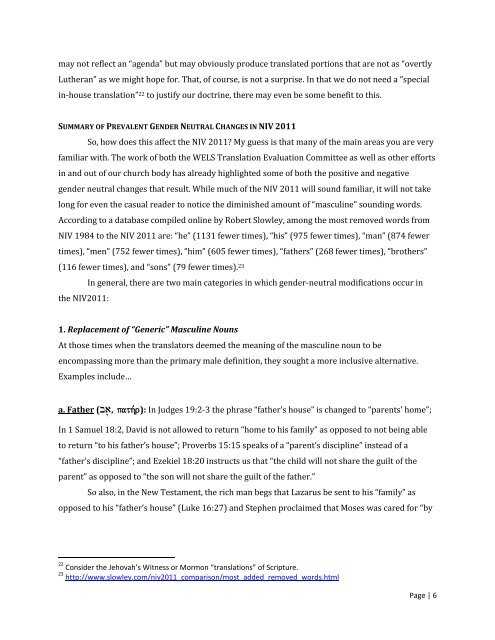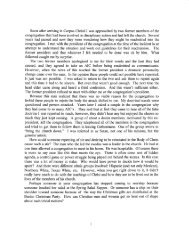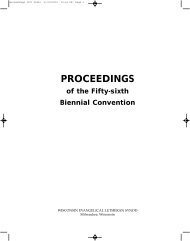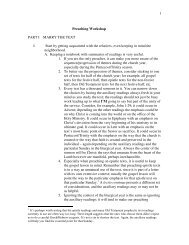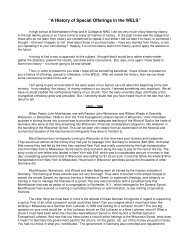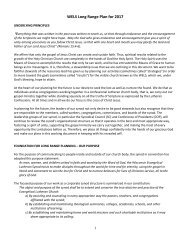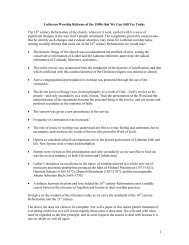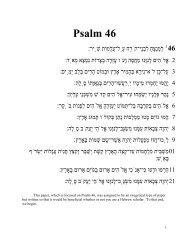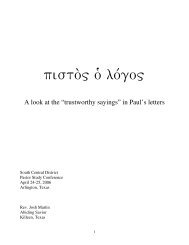A Brief Survey of the NIV 2011 and the Use of Gender-Neutral ...
A Brief Survey of the NIV 2011 and the Use of Gender-Neutral ...
A Brief Survey of the NIV 2011 and the Use of Gender-Neutral ...
Create successful ePaper yourself
Turn your PDF publications into a flip-book with our unique Google optimized e-Paper software.
may not reflect an “agenda” but may obviously produce translated portions that are not as “overtly<br />
Lu<strong>the</strong>ran” as we might hope for. That, <strong>of</strong> course, is not a surprise. In that we do not need a “special<br />
in-house translation” 22 to justify our doctrine, <strong>the</strong>re may even be some benefit to this.<br />
SUMMARY OF PREVALENT GENDER NEUTRAL CHANGES IN <strong>NIV</strong> <strong>2011</strong><br />
So, how does this affect <strong>the</strong> <strong>NIV</strong> <strong>2011</strong>? My guess is that many <strong>of</strong> <strong>the</strong> main areas you are very<br />
familiar with. The work <strong>of</strong> both <strong>the</strong> WELS Translation Evaluation Committee as well as o<strong>the</strong>r efforts<br />
in <strong>and</strong> out <strong>of</strong> our church body has already highlighted some <strong>of</strong> both <strong>the</strong> positive <strong>and</strong> negative<br />
gender neutral changes that result. While much <strong>of</strong> <strong>the</strong> <strong>NIV</strong> <strong>2011</strong> will sound familiar, it will not take<br />
long for even <strong>the</strong> casual reader to notice <strong>the</strong> diminished amount <strong>of</strong> “masculine” sounding words.<br />
According to a database compiled online by Robert Slowley, among <strong>the</strong> most removed words from<br />
<strong>NIV</strong> 1984 to <strong>the</strong> <strong>NIV</strong> <strong>2011</strong> are: “he” (1131 fewer times), “his” (975 fewer times), “man” (874 fewer<br />
times), “men” (752 fewer times), “him” (605 fewer times), “fa<strong>the</strong>rs” (268 fewer times), “bro<strong>the</strong>rs”<br />
(116 fewer times), <strong>and</strong> “sons” (79 fewer times). 23<br />
In general, <strong>the</strong>re are two main categories in which gender-neutral modifications occur in<br />
<strong>the</strong> <strong>NIV</strong><strong>2011</strong>:<br />
1. Replacement <strong>of</strong> “Generic” Masculine Nouns<br />
At those times when <strong>the</strong> translators deemed <strong>the</strong> meaning <strong>of</strong> <strong>the</strong> masculine noun to be<br />
encompassing more than <strong>the</strong> primary male definition, <strong>the</strong>y sought a more inclusive alternative.<br />
Examples include…<br />
a. Fa<strong>the</strong>r (ba', path,r): In Judges 19:2-3 <strong>the</strong> phrase “fa<strong>the</strong>r’s house” is changed to “parents’ home”;<br />
In 1 Samuel 18:2, David is not allowed to return “home to his family” as opposed to not being able<br />
to return “to his fa<strong>the</strong>r’s house”; Proverbs 15:15 speaks <strong>of</strong> a “parent’s discipline” instead <strong>of</strong> a<br />
“fa<strong>the</strong>r’s discipline”; <strong>and</strong> Ezekiel 18:20 instructs us that “<strong>the</strong> child will not share <strong>the</strong> guilt <strong>of</strong> <strong>the</strong><br />
parent” as opposed to “<strong>the</strong> son will not share <strong>the</strong> guilt <strong>of</strong> <strong>the</strong> fa<strong>the</strong>r.”<br />
So also, in <strong>the</strong> New Testament, <strong>the</strong> rich man begs that Lazarus be sent to his “family” as<br />
opposed to his “fa<strong>the</strong>r’s house” (Luke 16:27) <strong>and</strong> Stephen proclaimed that Moses was cared for “by<br />
22 Consider <strong>the</strong> Jehovah’s Witness or Mormon “translations” <strong>of</strong> Scripture.<br />
23 http://www.slowley.com/niv<strong>2011</strong>_comparison/most_added_removed_words.html<br />
Page | 6


